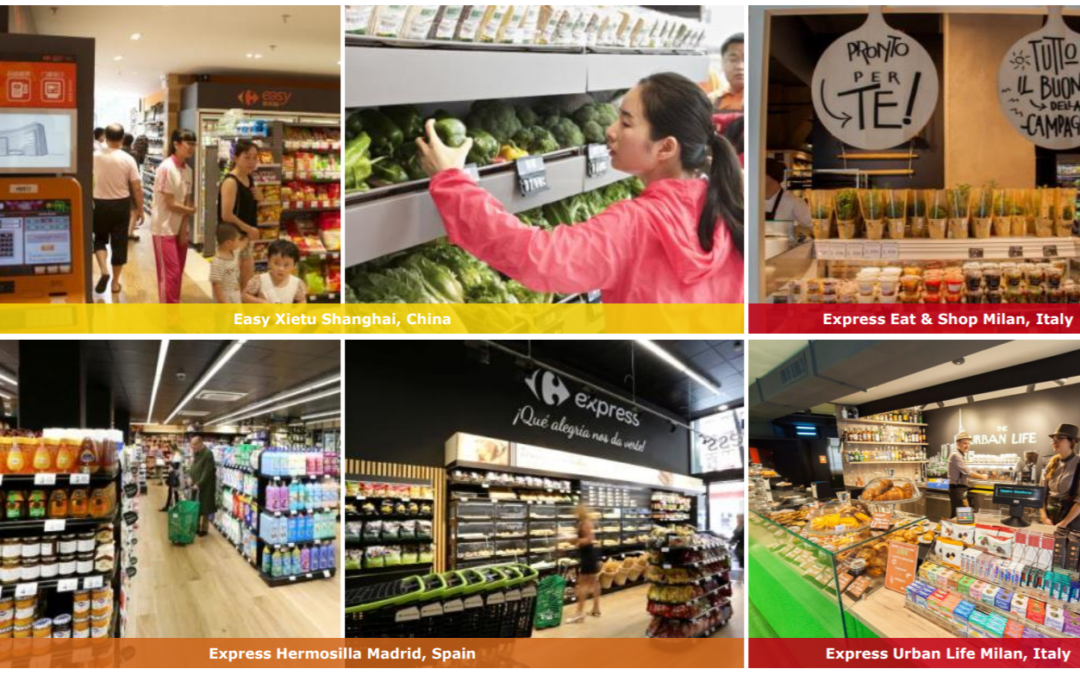“RETAIL IS NO LONGER ONLY ABOUT PRODUCTS ON SHELVES”. This statement, opening Carrefour’s Investor Day in April 2017, served to explain the company’s omni-channel strategy, which involves shopper focus as well as operational focus.
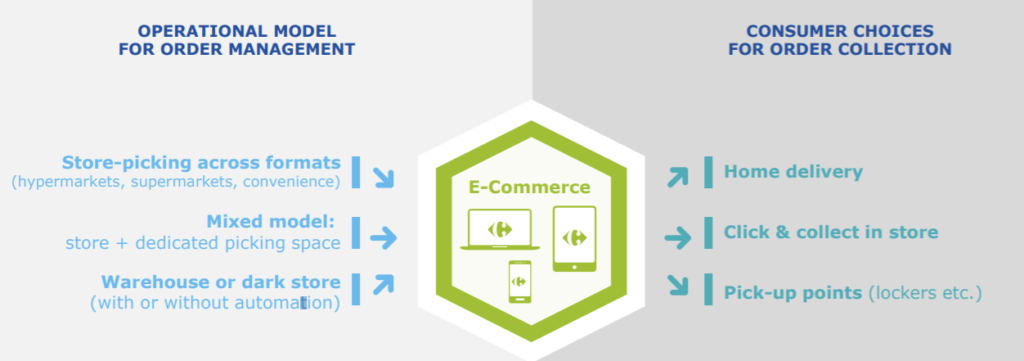
In an attempt to achieve operational excellence, the company is experimenting with various fulfillment models across markets:
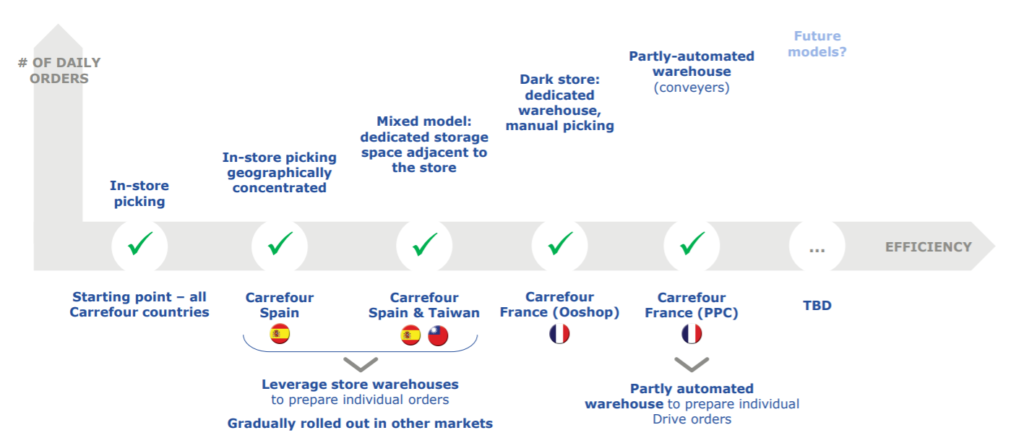
In addition, the company has launched websites focused at specific categories in France:
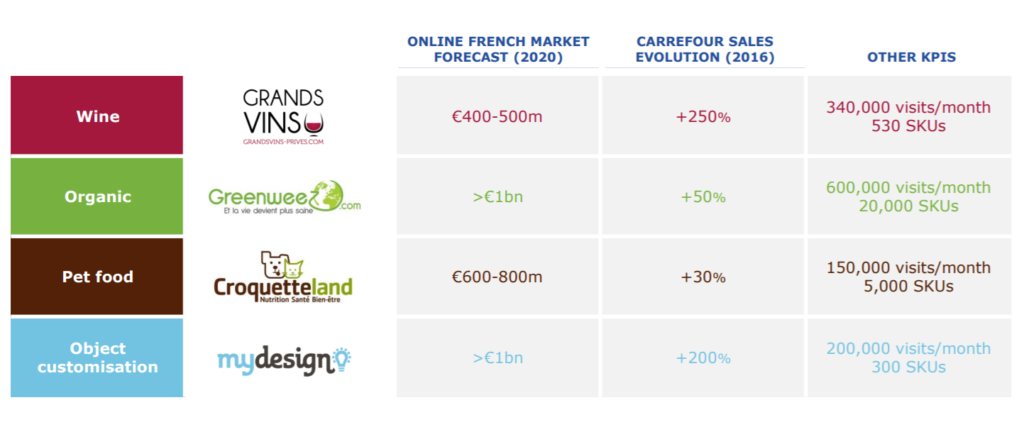
The company’s insights on the New Consumer guide the company’s innovation. According to the company, the new consumer is older (in 2050, 17% of consumers will be over 65 years old vs. 8.5% today), more urban (66% urbanization rate in 2050, vs. 54% in 2014), more digitized (X7 digital penetration between 2000 and 2016), and more mobile (34% use mobile devices to make purchases).
The company says there are 2 modes for shopping: CONVENIENT, SEAMLESS – “I want it MY way, at MY time and at MY place” vs ENJOYABLE (In-store & online) – “I want to have a PLEASANT SHOPPING EXPERIENCE” (see: Should I Stay Or Should I Go). Each format has a specific mission:
- Hypermarkets – everything under one roof at a competitive price – 51% of Carrefour’s sales.
- Supermarkets – choice close to home, focus on fresh – 25% of sales.
- Convenience – essential daily needs with extended shopping hours – 10% of sales.
- Cash & Carry – wholesale prices for a no-frills experience – 13% of sales.
- E-Commerce – “the broadest assortment at any time, any place, on any device” – just 1% of sales.
The company has launched new stores under each format; and declares that multi-format lifts revenues and consumer loyalty.

On the convenience side, the company is planning to grow the format 64% by 2019 compared to 2012, and has reported successful launches in China with “Carrefour Easy”.
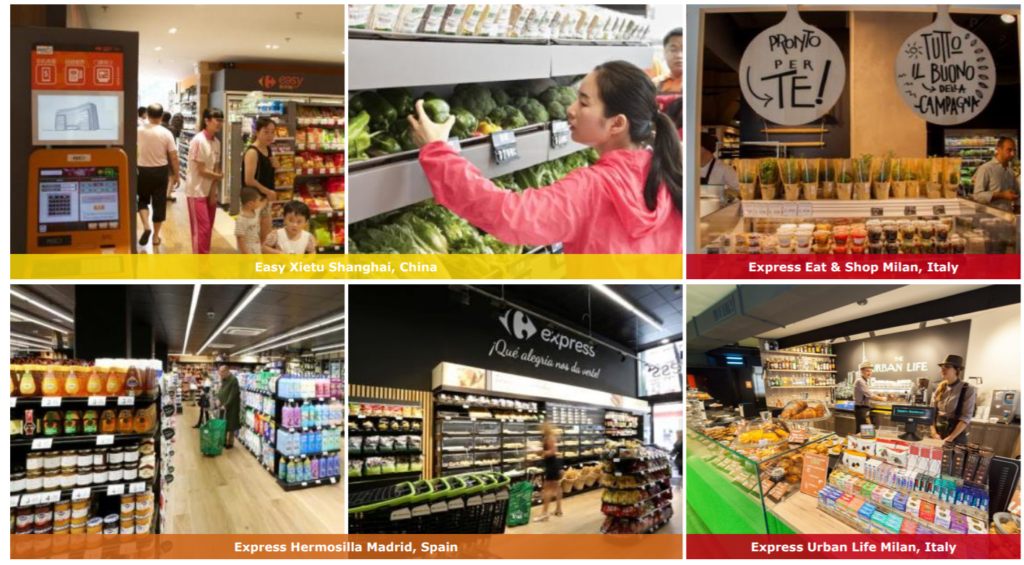
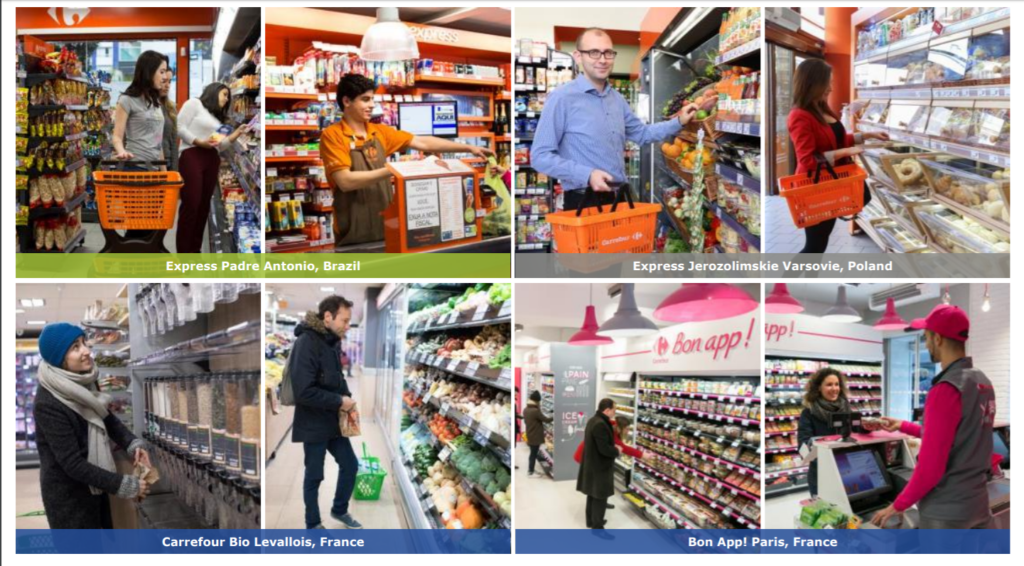 And, in October, Carrefour inaugurated its 100th proximity store in Brazil – a Carrefour Express store, which focuses on offering ever more services to make day-to-day life easier for customers. Proximity retail is currently one of the drivers of Carrefour’s expansion in Brazil, with over 30 stores inaugurated in 2017, providing more flexibility and convenience when buying daily and ready-to-eat products. To ensure quick and easy shopping experience, the layout of the Carrefour Express stores is especially developed to suit consumers’ habits, with products organized in a way that makes them easy to find in the aisles, depending on the characteristics and demands of the region. The stores also offer customized services, tailored to the preferences and habits of the customers of each region, such as 24-hour services, cafeteria and freshly-prepared snacks.
And, in October, Carrefour inaugurated its 100th proximity store in Brazil – a Carrefour Express store, which focuses on offering ever more services to make day-to-day life easier for customers. Proximity retail is currently one of the drivers of Carrefour’s expansion in Brazil, with over 30 stores inaugurated in 2017, providing more flexibility and convenience when buying daily and ready-to-eat products. To ensure quick and easy shopping experience, the layout of the Carrefour Express stores is especially developed to suit consumers’ habits, with products organized in a way that makes them easy to find in the aisles, depending on the characteristics and demands of the region. The stores also offer customized services, tailored to the preferences and habits of the customers of each region, such as 24-hour services, cafeteria and freshly-prepared snacks.
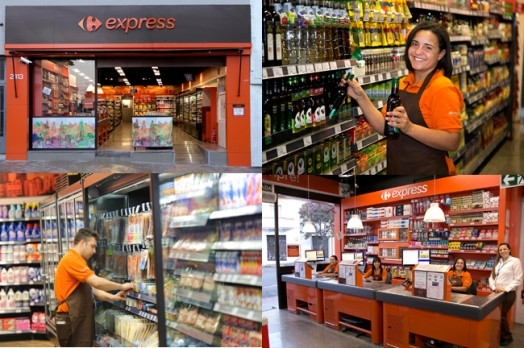
The company plans to grow its e-commerce business X3, to €4bn in 2020 (from €1.2bn in 2016). In order to do that, the company has rapidly launched e-commerce offerings around the globe, both through home delivery and click & collect (or click & drive).

In addition to digital channel development, the company found that, in food, consumers need transparency & commitments. 63% of consumers care about the origin of the products they purchase; 67% want fewer preservatives and coloring agents; 60% want local brands & fresh products; and 86% think that transparency in companies is important.
In response, Carrefour has launched the Únicos programme in Brazil, a marketing initiative for quality produce which does not correspond to the traditional food aesthetic marketing standards. In all, there are more than 10 types of fruits and vegetables with discounts starting at 30%. The program encourages the consumption of produce considered “ugly”, because it is in unusual sizes and shapes that do not come up to the aesthetic standards currently adopted by producers and retailers in Brazil.

The Únicos program will be rolled out every Friday in certain Carrefour hypermarkets in São Paulo (SP) and will have its own communications strategy and store furniture in the Market format. Since 2015, Atacadão, the company’s cash & carry format, has led the way in Brazil by commercializing produce considered non-aesthetically standard through the “Sans Form” program, where “ugly” fruits and vegetables are sold at a discount. The initiative is part of the main pillar of the company’s Sustainability Platform in Brazil designed to combat food waste.
The company also became the first retailer to commit to ensuring that all Carrefour-brand eggs in Europe will be produced using cage-free systems by 2025. Carrefour will collaborate with farmers and suppliers to reach this target.
The company declares that “THE NAME OF THE GAME IS CONSUMER EMPOWERMENT”. This principle guides the company’s foray into next generation retailing.

